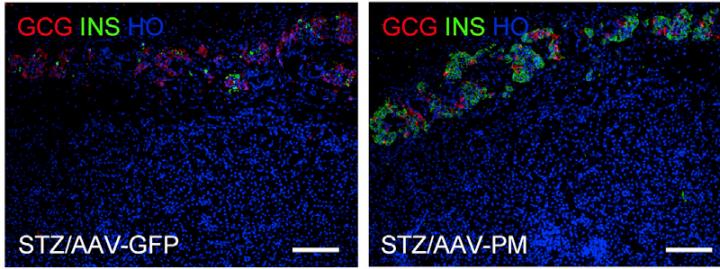07 Jan Viral Vector Delivered Gene Therapy That Reversed Diabetes in Mice
MedicalResearch.com Interview with:
Xiangwei Xiao, M.D., Ph.D.
Assistant Professor of Department of Surgery,
Children’s Hospital of Pittsburgh
University of Pittsburgh School of Medicine,
Pittsburgh, PA
MedicalResearch.com: What is the background for this study?
Response: Diabetes is a prevalent chronic disease characterized by persistently high blood glucose. Diabetes has two main subtypes, type 1 diabetes and type 2 diabetes. In type 1 diabetes, the immune system attacks and destroys insulin-producing beta cells in the pancreas, resulting in high blood levels of glucose. In type 2 diabetes, the beta cells do not produce enough insulin or the body is not able to use insulin effectively.
MedicalResearch.com: What are the main findings?
Response: A study published January 4th in Cell Stem Cell demonstrates that an intra-pancreatic gene therapy approach using an adeno-associated viral (AAV) vector carrying two proteins, Pdx1 and MafA, can reprogram plentiful alpha cells into functional, insulin-producing beta cells, which results in lifetime normal blood glucose in non-autoimmune diabetic mice, or an extended period of time of normal blood glucose in autoimmune type 1 diabetic mice.

In these two microscopy images, human islets (the source of insulin cells) were poisoned with a drug to remove the insulin cells, and then treated with either an empty virus (left panel) or the therapeutic virus (right panel), and then grown in a diabetic mouse. The green staining on the right reflects abundant insulin cell in these islets. The blood sugar of the diabetic mice were made normal by the gene-therapy-treated human islets on the right.
MedicalResearch.com: What should readers take away from your report?
Response: In contrast to reprogramming studies on transgenic animals that have primarily theoretical applications, this study is essentially the first description of a clinically translatable and immunosuppression-free approach to autoimmune diabetes that leads to normal blood glucose for a significant period,” says the first and corresponding author Xiangwei Xiao, an assistant professor at the University of Pittsburgh School of Medicine. “A clinical trial involving patients with both type 1 and type 2 diabetes is feasible in the near future, given the robust reversal of diabetes in rodents in this published article. Translatability to humans is also supported by the mechanism of treatment: AAV gene therapy delivered via intrapancreatic infusion using endoscopic retrograde cholangiopancreatography technology.
In patients with type 1 diabetes, beta-cell replacement therapy is likely doomed to failure because the new cells might fall victim to the same autoimmunity that destroyed the original cells. “We found that the engineered AAV vectors that specifically delivered Pdx1 and MafA converted plentiful pancreatic alpha cells into functional beta-like cells that, surprisingly, appeared resistant to immune attack, and survived for an extended period in mice with type 1 diabetes” said Dr. Xiao. “This resistance appears to be due to the slight difference between newly formed insulin-producing beta cells and normal beta cells, but this difference is so delicate that the new beta-cells still function well.”
MedicalResearch.com: What recommendations do you have for future research as a result of this work?
Response: Recently, the researchers have also obtained promising results in non-human primates, and are trying to introduce their gene therapy approach into clinical trials in the near future.
Citations: Xiangwei Xiao, Ping Guo, Chiyo Shiota, Ting Zhang, Gina M. Coudriet, Shane Fischbach, Krishna Prasadan, Joseph Fusco, Sabarinathan Ramachandran, Piotr Witkowski, Jon D. Piganelli, George K. Gittes. Endogenous Reprogramming of Alpha Cells into Beta Cells, Induced by Viral Gene Therapy, Reverses Autoimmune Diabetes. Cell Stem Cell, 2018; 22 (1): 78 DOI: 10.1016/j.stem.2017.11.020
MedicalResearch.com is not a forum for the exchange of personal medical information, advice or the promotion of self-destructive behavior (e.g., eating disorders, suicide). While you may freely discuss your troubles, you should not look to the Website for information or advice on such topics. Instead, we recommend that you talk in person with a trusted medical professional.
The information on MedicalResearch.com is provided for educational purposes only, and is in no way intended to diagnose, cure, or treat any medical or other condition. Always seek the advice of your physician or other qualified health and ask your doctor any questions you may have regarding a medical condition. In addition to all other limitations and disclaimers in this agreement, service provider and its third party providers disclaim any liability or loss in connection with the content provided on this website.
Last Updated on January 7, 2018 by Marie Benz MD FAAD
